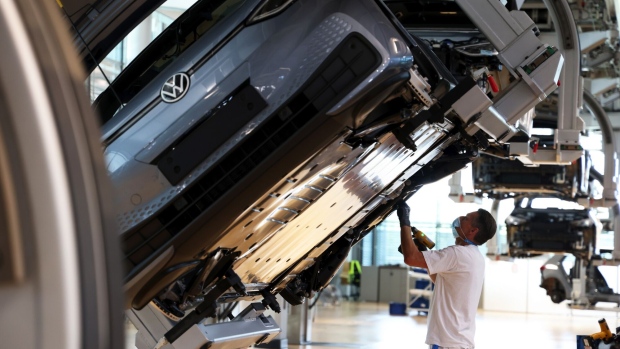Feb 22, 2024
VW Manager Says Spain Battery Plant May Struggle on Poor Demand
, Bloomberg News

(Bloomberg) -- Volkswagen AG’s push to make batteries and electric vehicles in Spain may be hurt by lackluster local demand, according to its top executive in the country.
The carmaker has started works on a €3 billion ($3.2 billion) cell factory near Valencia even though Spanish customers haven’t fully embraced EVs yet, said Wayne Griffiths, who heads the country’s mass-market Seat unit.
“From next year, nearly half of my company will be making electric vehicles,” Griffiths told Bloomberg on the sidelines of an industry event in Madrid. “There is not yet a market for this in Spain — that worries me.”
Volkswagen is investing more than €7 billion to set up a battery supply chain in Spain and produce compact EVs for its brands. Seat has had success with no-frills combustion-engine models including the Ibiza hatchback and its sporty offshoot brand Cupra, which is selling well also outside Spain.
A key part of VW’s Spanish push is the company’s third cell factory being built in Sagunto near Valencia, with output due to start by 2026.
But demand for EVs has cooled across the region, with Chinese rivals and Tesla Inc. exposing competitive weaknesses among Europe’s carmakers. Volkswagen has put plans to list its battery business on the backburner after the issues dimmed the unit’s prospects.
Read More: The Big Miss on EVs Is Remaking Europe’s Auto Industry
The situation is especially dire in Spain, where adoption of battery technology has trailed neighboring countries. Fully electric cars accounted for 5.6% of new-vehicle sales there last year, compared with 14.6% in the European Union.
A key hurdle to wider adoption is price, with the average Spaniard looking to spend just under €28,000 on a new car, according to a consumer survey — and very few electric models are offered below that price point. They include the Chinese-made MG ZS, a compact sport utility vehicle that starts at €20,480. In December, the model — including its cheaper gasoline version — topped Spain’s sales rankings.
Seat will make compact EVs for several brands including Cupra starting in 2025.
“I’m very worried,” said Griffiths, who’s been leading Seat since October 2020. “Next year I will be making electric cars, but for what? If it’s only 5% of the market.”
©2024 Bloomberg L.P.

